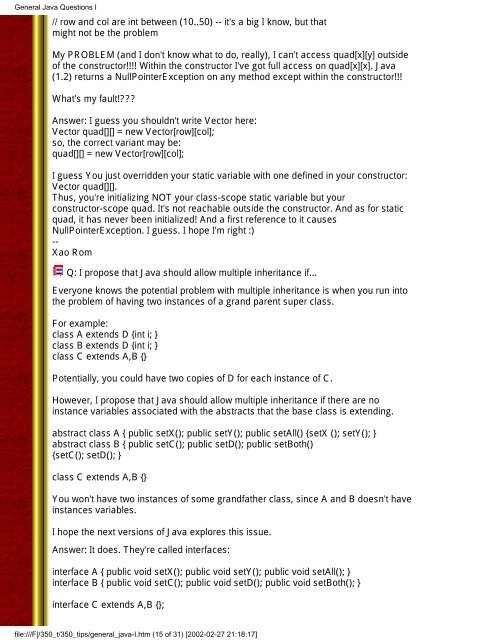You also want an ePaper? Increase the reach of your titles
YUMPU automatically turns print PDFs into web optimized ePapers that Google loves.
General <strong>Java</strong> Questions I<br />
// row and col are int between (10..50) -- it's a big I know, but that<br />
might not be the problem<br />
My PROBLEM (and I don't know what to do, really), I can't access quad[x][y] outside<br />
of the constructor!!!! Within the constructor I've got full access on quad[x][x]. <strong>Java</strong><br />
(1.2) returns a NullPointerException on any method except within the constructor!!!<br />
What's my fault!???<br />
Answer: I guess you shouldn't write Vector here:<br />
Vector quad[][] = new Vector[row][col];<br />
so, the correct variant may be:<br />
quad[][] = new Vector[row][col];<br />
I guess You just overridden your static variable with one defined in your constructor:<br />
Vector quad[][].<br />
Thus, you're initializing NOT your class-scope static variable but your<br />
constructor-scope quad. It's not reachable outside the constructor. And as for static<br />
quad, it has never been initialized! And a first reference to it causes<br />
NullPointerException. I guess. I hope I'm right :)<br />
--<br />
Xao Rom<br />
Q: I propose that <strong>Java</strong> should allow multiple inheritance if...<br />
Everyone knows the potential problem with multiple inheritance is when you run into<br />
the problem of having two instances of a grand parent super class.<br />
For example:<br />
class A extends D {int i; }<br />
class B extends D {int i; }<br />
class C extends A,B {}<br />
Potentially, you could have two copies of D for each instance of C.<br />
However, I propose that <strong>Java</strong> should allow multiple inheritance if there are no<br />
instance variables associated with the abstracts that the base class is extending.<br />
abstract class A { public setX(); public setY(); public setAll() {setX (); setY(); }<br />
abstract class B { public setC(); public setD(); public setBoth()<br />
{setC(); setD(); }<br />
class C extends A,B {}<br />
You won't have two instances of some grandfather class, since A and B doesn't have<br />
instances variables.<br />
I hope the next versions of <strong>Java</strong> explores this issue.<br />
Answer: It does. They're called interfaces:<br />
interface A { public void setX(); public void setY(); public void setAll(); }<br />
interface B { public void setC(); public void setD(); public void setBoth(); }<br />
interface C extends A,B {};<br />
file:///F|/350_t/350_tips/general_java-I.htm (15 of 31) [2002-02-27 21:18:17]






